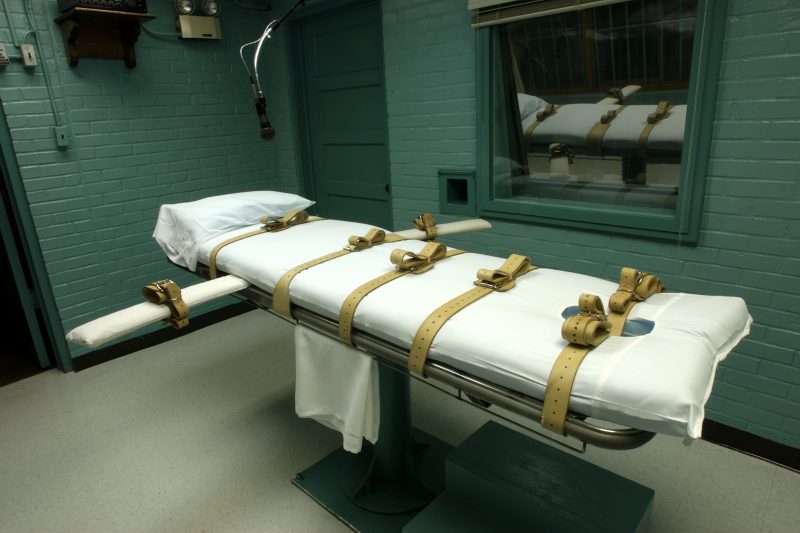One State Representative is Fighting to Stop Texas from Executing People With Mental Illness
By Samantha Eisenmenger
Reporting Texas
This story contains a graphic description of self-harm that may be offensive to some readers.

The gurney used by the Texas Department of Criminal Justice to carry out the Texas Death Penalty at the Walls unit in Huntsville, Texas. Texas Department of Criminal Justice photo.
Andre Thomas killed his estranged wife and her two children in March 2004. Five days later, the 21-year-old from Sherman, Texas, gouged out his right eye. In 2008, after being sentenced to death, Thomas gouged out his remaining eye and ate it.
Thomas, who has schizophrenia, was set to be executed on April 5. Thomas’ legal team requested clemency from Gov. Greg Abbott and the Texas Board of Pardons and Paroles in February. In March, a Grayson County district judge withdrew the execution date and ordered Thomas’ legal team to file their argument proving his incompetence by July 5.
“Andre Thomas is one of the most mentally ill prisoners in Texas history,” Maurie Levin, lead attorney for Thomas, said in a press conference in February.
Advocates say Thomas’ case is a travesty of justice, and Texas should not be executing people with mental illness.
Rep. Toni Rose, D-Dallas, has filed House Bill 727, which would end the practice moving forward. Rose filed similar measures during the last three legislative sessions, but none have made it to the governor’s desk. However, each time her bills were voted on they gained more bi-partisan support, including Representative Jeff Leach, R-Plano, who joint-authored the bill in 2021.
Texas has executed 581 people since 1976, more than any state in the nation, according to the Death Penalty Information Center. A total of 1,565 people have been executed in the United States in the same timeframe.
While attitudes are changing, 65% of Texans still support the death penalty, according to a December 2022 Texas Politics Project poll, down from 78% in September 2010.
The United States Supreme Court ruled in Atkins v. Virginia in 2002 that executions of people with intellectual disabilities, usually defined as a person with an IQ of 70 or below and lacking the mental capacity to understand right from wrong, is unconstitutional. Executing people with mental illnesses and conditions that affect a person’s thinking, feeling, behavior or mood are not banned under Atkins v. Virginia.
Twenty-six states have either banned the death penalty completely or stopped executing people. Ohio is the only state that has explicitly banned the practice of executing mentally ill people, according to the Death Penalty Information Center.
While up-to-date statistics on the executions of people with mental illness are sparse, Texas executed 25 people with mental illness between 1976 and 2010, according to the Texas Coalition to Abolish the Death Penalty.
Greg Hansch is the executive director of the Texas chapter of the National Alliance on Mental Illness, an advocacy organization which focuses on improving the lives of people with mental illness.
Mental illness often affects cognition, decision making and the ability to decipher between what’s right and what’s wrong, Hansch told Reporting Texas.
“It’s struck me as inequitable that Texas has a history of executing individuals who had severe mental illness at the time of the offense. And still to this day, this practice continues,” Hansch said.
Death penalty reform, like Rose’s bill, has garnered support from Republicans as well as Democrats.
Jason Vaughn, a conservative activist and Greater Houston Republican Liberty Caucus President, spoke during the Texas Coalition to Abolish the Death Penalty Annual Conference in Austin in February.
“Whether that be from a religious or scientific perspective, that life is important. And the government’s priority is to protect that life,” Vaughn said.
Kimberly Harrison, a forensic psychologist and board president of the Texas Coalition to Abolish the Death Penalty, says there are still misperceptions about mental illness.
Sometimes observers believe that the accused are “faking it” to receive a lighter sentence, Harrison said.
The death penalty is a part of Texas’ identity as a law and order state.
Cal Jillson is a political science professor at Southern Methodist University in Dallas. Texas has a long history of state-sanctioned deadly force, Jillson said. From killing enslaved African-Americans, to lynching Black people during the 20th century, to the formal death penalty today, capital punishment has become part of the left-right culture war divide in the state.
“Republican candidates in Texas are always concerned to be seen as conservative. And if they are going to run for president, they want to project that ‘harsh on crime’ conservatism, nationally,” Jillson said.
Some advocates are hopeful that Texas will eventually stop killing people with mental illness, but they are aware that many observers are skeptical that the legislature will find the political will to act on the issue.
“Texas just has a sort of weird, sick relationship with the death penalty. And a lot of people are actually proud of the fact that we execute more people than any other state,” Harrison said. “It’s a cultural thing.“
“I think there’s a lot of misunderstanding and kind of just lack of empathy,” she said. “Sort of Old Testament retributive-style justice.”
The Criminal Jurisprudence Committee unanimously passed HB 727 in March. The measure is currently awaiting a vote on the floor of the House.